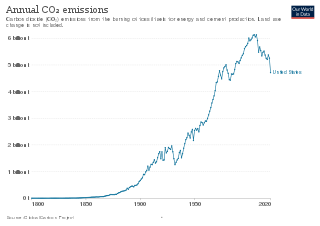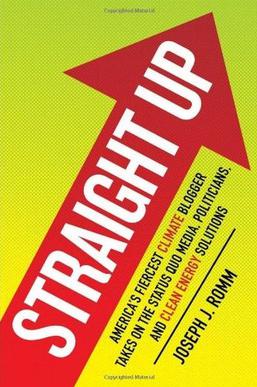
The organized environmental movement is represented by a wide range of non-governmental organizations or NGOs that seek to address environmental issues in the United States. They operate on local, national, and international scales. Environmental NGOs vary widely in political views and in the ways they seek to influence the environmental policy of the United States and other governments.

The Skeptical Environmentalist: Measuring the Real State of the World is a book by Danish author and statistician Bjørn Lomborg which focuses on the author's view of environmental economics and issues. It was first published in Danish in 1998 by Centrum, and in English by Cambridge University Press in 2001.

The environmental movement, is a social movement that aims to protect the natural world from harmful environmental practices in order to create sustainable living. Environmentalists advocate the just and sustainable management of resources and stewardship of the environment through changes in public policy and individual behavior. In its recognition of humanity as a participant in ecosystems, the movement is centered on ecology, health, as well as human rights.

Mark Lynas is a British author and journalist whose work is focused on environmentalism and climate change. He has written for the New Statesman, The Ecologist, Granta and Geographical magazines, and The Guardian and The Observer newspapers in the UK, as well as the New York Times and Washington Post in the United States; he also worked on and appeared in the film The Age of Stupid. He was born in Fiji, grew up in Peru, Spain and the United Kingdom and holds a degree in history and politics from the University of Edinburgh. He has published several books including Six Degrees: Our Future on a Hotter Planet (2007) and The God Species: Saving the Planet in the Age of Humans (2011). Lynas is research and climate lead for the Alliance for Science and is co-founder of the pro-science environmental network RePlanet. Since 2009 he has been climate advisor to former president of the Maldives Mohamed Nasheed, and he currently works to assist Nasheed with the Climate Vulnerable Forum, a group of the world's most climate-vulnerable 58 developing countries. He has co-authored a number of peer-reviewed scientific publications, including a 2021 paper which found that the consensus on anthropogenic climate change in the scholarly literature now exceeds 99%.

Environmentalism or environmental rights is a broad philosophy, ideology, and social movement about supporting life, habitats, and surroundings. While environmentalism focuses more on the environmental and nature-related aspects of green ideology and politics, ecologism combines the ideology of social ecology and environmentalism. Ecologism is more commonly used in continental European languages, while environmentalism is more commonly used in English but the words have slightly different connotations.

Joseph J. Romm is an American researcher, author, editor, physicist and climate expert, who advocates reducing greenhouse gas emissions to limit global warming and increasing energy security through energy efficiency and green energy technologies. Romm is a Fellow of the American Association for the Advancement of Science. In 2009, Rolling Stone magazine named Romm to its list of "100 People Who Are Changing America", and Time magazine named him one of its "Heroes of the Environment (2009)", calling him "The Web's most influential climate-change blogger".
The Stern Review on the Economics of Climate Change is a 700-page report released for the Government of the United Kingdom on 30 October 2006 by economist Nicholas Stern, chair of the Grantham Research Institute on Climate Change and the Environment at the London School of Economics (LSE) and also chair of the Centre for Climate Change Economics and Policy (CCCEP) at Leeds University and LSE. The report discusses the effect of global warming on the world economy. Although not the first economic report on climate change, it is significant as the largest and most widely known and discussed report of its kind.
Anti-environmentalism is a set of ideas and actions that oppose environmentalism as a whole or specific environmental policies or environmental initiatives.

Hell and High Water: Global Warming – the Solution and the Politics – and What We Should Do is a book by author, scientist, and former U.S. Department of Energy official Joseph J. Romm, published December 26, 2006. The author is "one of the world's leading experts on clean energy, advanced vehicles, energy security, and greenhouse gas mitigation."

The Clean Tech Revolution: The Next Big Growth and Investment Opportunity is a 2007 book by Ron Pernick and Clint Wilder, who say that commercializing clean technologies is a profitable enterprise that is moving steadily into mainstream business. As the world economy faces challenges from energy price spikes, resource shortages, global environmental problems, and security threats, clean technologies are seen to be the next engine of economic growth.

Michael D. Shellenberger is an American author and journalist who writes about politics, the environment, climate change, and nuclear power. He is a co-founder of the Breakthrough Institute and the California Peace Coalition. Shellenberger founded the pro-nuclear non-profit Environmental Progress in 2016.

The environmental policy of the United States is a federal governmental action to regulate activities that have an environmental impact in the United States. The goal of environmental policy is to protect the environment for future generations while interfering as little as possible with the efficiency of commerce or the liberty of the people and to limit inequity in who is burdened with environmental costs. As his first official act bringing in the 1970s, President Richard Nixon signed the U.S. National Environmental Policy Act (NEPA) into law on New Years Day, 1970. Also in the same year, America began celebrating Earth Day, which has been called "the big bang of U.S. environmental politics, launching the country on a sweeping social learning curve about ecological management never before experienced or attempted in any other nation." NEPA established a comprehensive US national environmental policy and created the requirement to prepare an environmental impact statement for “major federal actions significantly affecting the quality of the environment.” Author and consultant Charles H. Eccleston has called NEPA the world's “environmental Magna Carta”.

Straight Up: America's Fiercest Climate Blogger Takes on the Status Quo Media, Politicians, and Clean Energy Solutions is a book by author, blogger, physicist and climate expert Joseph J. Romm. A Fellow of the American Association for the Advancement of Science and former Acting Assistant Secretary of the U.S. Department of Energy, Romm writes about methods of reducing global warming and increasing energy security through energy efficiency, green energy technologies and green transportation technologies.

Peter Taylor is a UK environmentalist, public activist on issues ranging from nuclear safety, ocean pollution, biodiversity strategies, renewable energy and climate change. He is the author of five books: Beyond Conservation: A Wildland Strategy (2005), Shiva's Rainbow, Chill: A Reassessment of Global Warming Theory (2009), Questions of Resilience: Development Aid in a Changing Climate (2010), and Rewilding: ECOS Writings on Wildland and Conservation Values (2011).
Ted Nordhaus is an American author and the director of research at The Breakthrough Institute. He has co-edited and written a number of books, including Break Through: From the Death of Environmentalism to the Politics of Possibility (2007) and An Ecomodernist Manifesto (2015) with collaborator Michael Shellenberger.
The Breakthrough Institute is an environmental research center located in Berkeley, California. Founded in 2007 by Michael Shellenberger and Ted Nordhaus, The institute is aligned with ecomodernist philosophy. The Institute advocates for an embrace of modernization and technological development in order to address environmental challenges. Proposing urbanization, agricultural intensification, nuclear power, aquaculture, and desalination as processes with a potential to reduce human demands on the environment, allowing more room for non-human species.
Green imperialism is a derogatory epithet alluding to what is perceived as a Western strategy to influence the internal affairs of mostly developing nations in the name of environmentalism.

Ecomodernism is an environmental philosophy which argues that technological development can protect nature and improve human wellbeing through eco-economic decoupling, i.e., by separating economic growth from environmental impacts.

Michel Gelobter is an American born social entrepreneur especially in the field of clean technology, who is also known for his research into and advocacy for environmental justice and social sector innovation.

Apocalypse Never: Why Environmental Alarmism Hurts Us All is a 2020 book by Michael Shellenberger.














